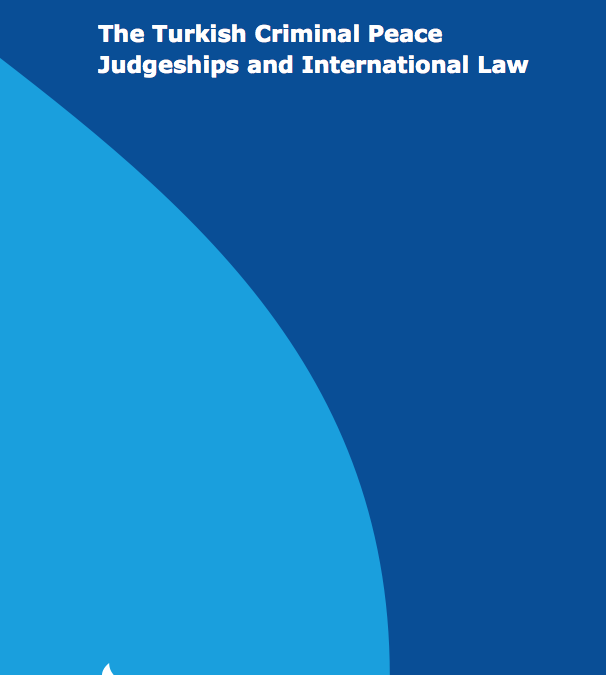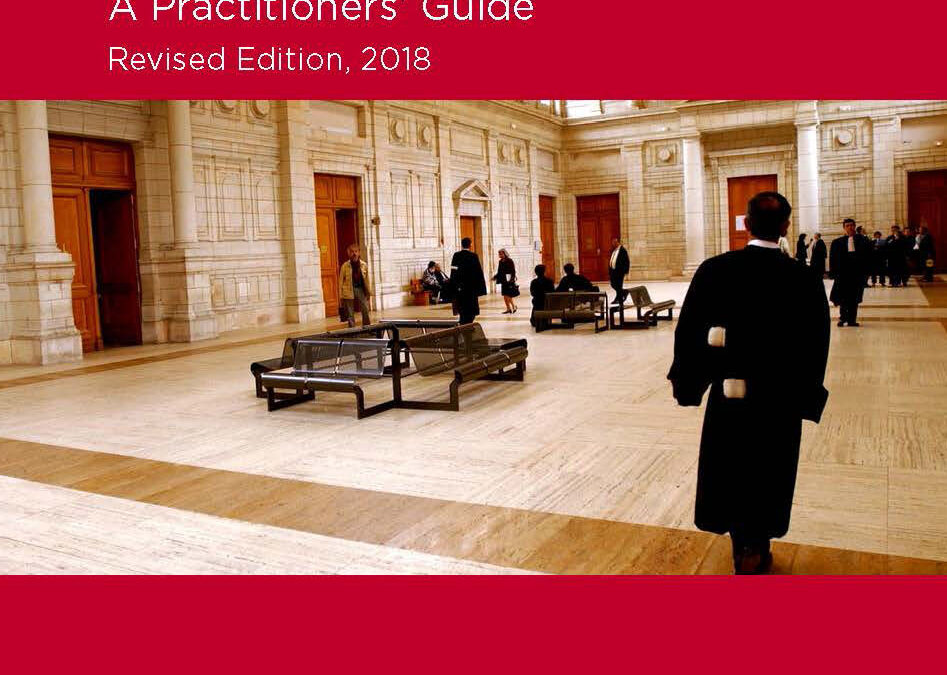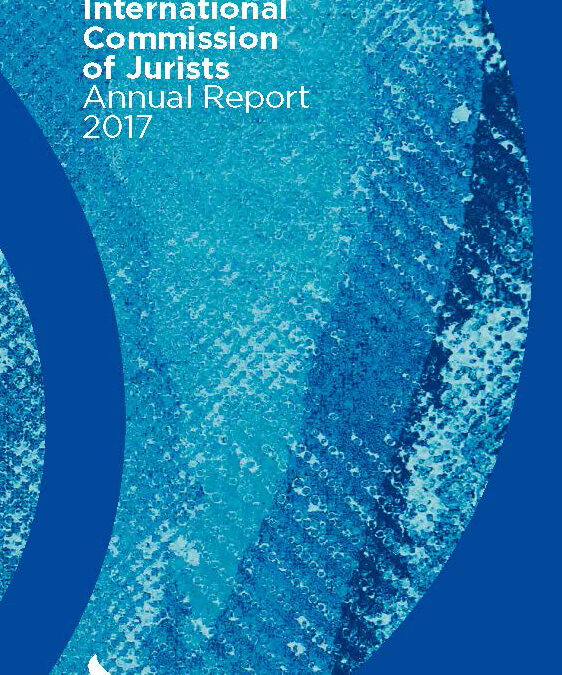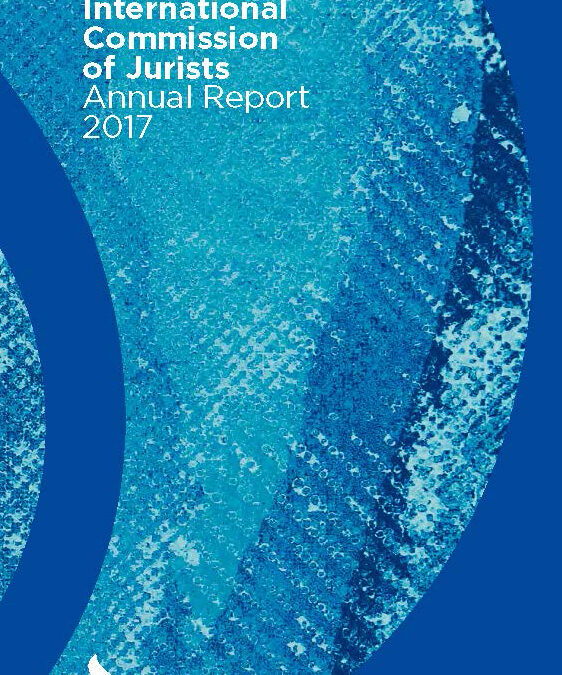
Mar 13, 2019
The ICJ said today in an new report that Moldova remained a significant way from having a functionally independent judiciary, which is an indispensable element in the country’s capacity to deliver justice for its people and institutions.
The report ”Only an empty shell” – The undelivered promise of an independent judiciary in Moldova sets out a number of specific recommendations for reform which with a view to achieving a fully independent judiciary and effective justice system.
The report followed its field mission to Moldova in November 2018, which built upon the work of previous missions undertaken in 2004 and in 2012.
“While many significant legislative reforms have been undertaken, judicial independence is far from being achieved in Moldova,” said Massimo Frigo, Senior Legal Adviser for the ICJ Europe and Central Asia Programme,
“Reforms are needed in the law, but more than that a change is needed the mindset and working culture of many judges themselves that must protect and promote judicial independence in all of their work,” he added.
The ICJ acknowledged that important progress had been achieved in many areas, including in efforts to secure audio-recordings of all court hearings, the introduction of a system of random allocation of cases, and staff and salary increases for all judges.
However, the ICJ has concluded that the implementation of the most crucial legal reforms is significantly lagging behind and often lacks political will and conviction.
A culture of excessive hierarchy in the judiciary and of the judge remained prevalent among judges.
The ICJ is concerned at reports that the Superior Council of Magistracy (SCM) – a judicial self-governance body – instead of playing its crucial role of defending the independence of the judiciary, institutionally and in respect of individual judges, has become an instrument of pressure on individual judges and a threat to their independence.
“During our mission, we were presented with witness statements and stories of judges living often in a condition of fear: fear to express their opinions on the situation of the judiciary; and fear of criminal prosecution solely for issuing a decision contrary to the requests of the prosecutor’s office or of other powerful interests,” said Massimo Frigo.
Achieving judicial independence requires a change of attitude towards the judiciary from the executive and other sources of State and private power, but most importantly from the judiciary itself.
Contact
Massimo Frigo, Senior Legal Adviser, Europe and Central Asia Programme, International Commission of Jurists, massimo.frigo@icj.org
Download
The full story with additional information:
Moldova-Only an empty shell report launch-News-press releases-2019-ENG
The full version of the report and full set of recommendations is available in English and Romanian:
Moldova-Only an empty shell-Publications-Reports-Mission reports-2019-ENG
Moldova-Only an empty shell-Publications-Reports-Mission reports-2019-ROM

Feb 13, 2019
Today, the ICJ and the Human Rights Joint Platform (IHOP) published a briefing paper on the system of Turkish Criminal Peace Judgeships and its compliance with international law.
Since their creation in 2014, the Turkish criminal peace judgeships have been the focus of much criticism with regard to violations of human rights, as they are at the forefront of the authorisation or judicial review of decisions restricting the right to liberty and other human rights.
This briefing paper assesses the institution of the criminal peace judgeships in Turkey, established in 2014, and its compliance with the obligations undertaken by Turkey under international human rights law.
The ICJ-IHOP briefing paper concludes that the system of the criminal peace judges in Turkey does not meet international standards for independent and impartial review of detention, and suggests a set of detailed constitutional and legislative reforms to put the system back in line with Turkey’s human rights obligations.
The publication in English here.
The publication in Turkish here.

Nov 22, 2018
Under its Global Redress and Accountability Initiative, the ICJ has launched its 2018 update to Practitioners’ Guide No 2, outlining the international legal principles governing the right to a remedy and reparation for victims of gross human rights violations and abuses by compiling international jurisprudence on the issues of reparations.
The Guide is aimed at practitioners who may find it useful to have international sources at hand for their legal, advocacy, social or other work.
Amongst revisions to the Guide, the 2018 update includes new sections on terminology and on non-discrimination;updated sections on the notions of ‘collective victims’, ‘collective rights’, the rights of ‘groups of individuals’; additional references to the work of the Committeeon the Elimination of Discrimination against Women and the Committee on the Rights of the Child; an updated section on remedies for unlawful detention, including references to the 2015 UN Basic Principles and Guidelines on Habeas Corpus; and updates on gender-based violence and on violations occurring in the context of business activities.
The Guide first recalls the States’ general duty to respect, protect, ensure and promote human rights, particularly the general duty of the State and the general consequences flowing from gross human rights violations (Chapter 1).
It then defines who is entitled to reparation: victims are, of course, the first beneficiaries of reparations, but other persons also have a right to reparation under certain circumstances (Chapter 2).
The Guide goes on to address the right to an effective remedy, the right to a prompt, thorough, independent and impartial investigation and the right to truth (Chapters 3-4).
It then addresses the consequences of gross human rights violations, i.e. the duty of the State to cease the violation if it is ongoing and to guarantee that no further violations will be committed (Chapter 6). It continues by describing the different aspects of the right to reparation, i.e. the right to restitution, compensation, rehabilitation and satisfaction (Chapter 7).
While the duty to prosecute and punish perpetrators of human rights violations is not necessarily part of the reparation as such, it is so closely linked to the victim’s right to redress and justice that it must be addressed in this Guide (Chapter 8).
Frequent factors of impunity, such as trials in military tribunals, amnesties or comparable measures and statutes of limitations for crimes under international law are also discussed (Chapter 9).
The guide is now also available in Turkish.
Download
Universal-Right to a Remedy-Publications-Reports-Practitioners’ Guides-2018-ENG (full text in English, PDF)
Universal-Right-to-a-Remedy-Publications-Reports-Practitioners-Guides-2018-TR [1] (full text in Turkish, PDF)
Universal-Right-to-a-Remedy-Publications-Reports-Practitioners-Guides-2018-THA (full text in Thai, PDF)

Sep 14, 2018
La CIJ a publié son rapport annuel 2017 (disponible uniquement en anglais), qui offre un résumé concis du travail effectué par la CIJ au cours de l’année écoulée.
Pendant plus de 60 ans, la CIJ a joué un rôle prépondérant dans la promotion de l’état de droit et de sa mise en œuvre au niveau international et national, et a travaillé sans relâche pour lutter contre les injustices à travers le monde.
Bien que des progrès notables aient été réalisés au fil des ans, nous sommes malheureusement dans une période de régression, confrontés à de nouveaux défis qui ne proviennent pas d’un clivage Est/Ouest ou Nord/Sud, mais plutôt problème d’ordre mondial et endémique.
La CIJ l’a cependant déjà constaté auparavant. Après les attentats terroristes du 11 septembre, de nombreux états, y compris des démocraties libérales, ont adopté des mesures antiterroristes qui menaçaient l’essentiel du cadre international des droits de l’Homme mis en place depuis la seconde guerre mondiale, affirmant que le respect des droits de l’Homme n’était plus adéquat.
La CIJ a réagi à cette crise en créant un panel de juristes éminents, dont le rapport identifiait clairement les enjeux, réaffirmant la valeur des droits de l’Homme et formulant des recommandations claires aux Etats sur la manière de concevoir des projets antiterroristes respectueux des droits fondamentaux.
Aujourd’hui, le concept de l’état de droit lui-même est attaqué et la CIJ, comme par le passé, relève ce défi en réaffirmant les valeurs et principes fondamentaux du droit relatif aux droits de l’Homme, et en cherchant à surmonter les propos dommageables qui prétendent que le système n’est plus pertinent pour les individus.
Bien que la CIJ reconnaisse que le système de droits est confronté à des défis, nous restons fermement attachés à renforcer la protection des droits grâce à des cadres internationaux éprouvés.
En 2017, la CIJ a abordé des éléments clés de l’état de droit, notamment l’indépendance du pouvoir judiciaire, qui constitue une garantie fondamentale pour la protection des droits et de la responsabilité.
Nous avons continué d’œuvrer à notre vision d’un monde où chacun puisse exercer ses droits en travaillant avec et au nom des groupes les plus marginalisés, notamment les habitants déplacés de l’État de Rakhine, les enfants migrants et les communautés autochtones.
Nous avons continué à lutter contre la culture de l’impunité et pour garantir la responsabilité dans des endroits tels que le Cambodge, le Myanmar, le Népal, le Tadjikistan et la Tunisie.
Il est important de noter que la CIJ a déjà connu quelques succès dans ce travail, notamment dans ses efforts pour plaider contre la proposition faite par l’Afrique du Sud de se retirer de la Cour pénale internationale.
L’année dernière, la CIJ a aussi organisé un forum sur les systèmes de justice coutumiers et traditionnels et dénoncé l’incapacité des états à rendre des comptes sur les opérations de restitution.
Elle a été activement impliquée dans des questions telles que l’accès à la justice pour les femmes, préconisé des réformes nationales, travaillé avec des systèmes judiciaires nationaux, dispensé des formations aux juristes et aux défenseurs des droits de l’Homme, et continué à dénoncer les violations flagrantes des normes internationales, telles que le recours à des tribunaux militaires pour juger des civils.
Les remises en question actuelles en matière de droits de l’Homme et notamment du cadre juridique international qui les soutient sont en effet très graves.
La CIJ, par son expérience et ses actes, est particulièrement qualifiée pour relever le défi mais cela exigera que nous réaffirmions vigoureusement notre vision d’un état de droit respectueux de la dignité et des droits de l’Homme de chacun.
Télécharger
Universal-ICJ Annual Report 2017-Publications-Reports-Annual Report-2018-ENG (rapport complet en PDF, uniquement disponible en anglais)

Sep 14, 2018
The ICJ has issued its Annual Report 2017, which offers a concise summary of the work carried out by the ICJ over the past year.
For over 60 years, the ICJ has played a preeminent role in promoting the rule of law and its implementation internationally and domestically and has worked tirelessly to fight injustices around the globe.
While notable progress has been made over the years, sadly we are now in a period of regression, facing new challenges that are neither East/West nor North/South in origin but are rather global and endemic.
The ICJ, however, has seen this before. After the 9/11 terrorist attacks, many States, including some liberal democracies, adopted counter-terrorism measures that threatened the very core of the international human rights framework put in place since the Second World War, claiming that observance of human rights was no longer convenient.
The ICJ responded to that crisis by establishing an Eminent Jurists Panel whose report clearly identified the issues, reaffirmed the value of human rights and set out clear recommendations to States on how to craft counter-terrorism initiatives that respect basic rights.
Today the concept of the rule of law itself is under attack, and the ICJ, as in the past, is meeting this challenge head on by reasserting core values and principles of human rights law and by seeking to overcome harmful narratives that claim that the system is no longer relevant to individuals.
While the ICJ recognizes the rights system is beset by challenges, we remain deeply committed to enhancing rights protections through tried and tested international frameworks.
The ICJ has had an active 2017 addressing key elements of the rule of law, including the independence of the judiciary, which provides a fundamental safeguard for rights protections and accountability.
We have continued to work towards our vision of a world where everyone is able to exercise her/his rights by working with and on behalf of the most marginalized groups, including displaced inhabitants of the Rakhine state, migrant children and indigenous communities.
We continued to strive against cultures of impunity and ensuring accountability in places such as Cambodia, Myanmar, Nepal, Tajikistan and Tunisia.
Importantly, the ICJ has already had some successes in this work, such as in the ICJ led efforts to advocate against South Africa’s proposed withdrawal from the International Criminal Court.
Last year, the ICJ also convened a forum on customary and traditional justice systems, reported on the failure of States to ensure accountability for renditions operations, actively engaged at the UN on issues such as women’s access to justice, advocated for national reforms, worked with domestic justice systems, provided training for jurists and rights defenders, and continued to denounce clear violations of international norms, such as the use of military courts to try civilians.
The current challenges to human rights and the international legal framework supporting them are grave indeed.
The ICJ by experience and deeds is uniquely qualified to meet these challenges but this will require us to vigorously reaffirm our vision of a rule of law that upholds the dignity and human rights of every person.
Download
Universal-ICJ Annual Report 2017-Publications-Reports-Annual Report-2018-ENG (full report in PDF)









